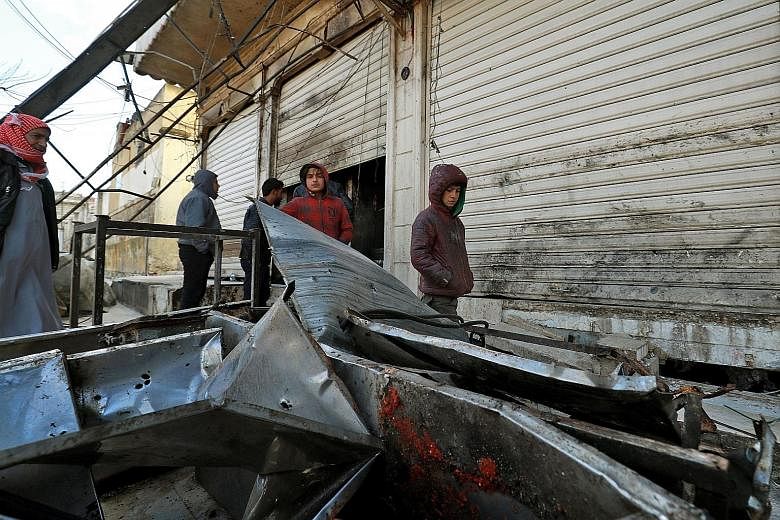WASHINGTON • US President Donald Trump's decision to pull troops out of Syria came under renewed pressure after a suicide attack claimed by the Islamic State in Iraq and Syria (ISIS), the terrorist group which he said a month ago was effectively defeated.
Four Americans were killed and three wounded in the attack in the northern town of Manbij on Wednesday. The Pentagon said its forces were on a "routine patrol" when the attack occurred.
The Syrian Observatory For Human Rights, which monitors the almost eight-year-old civil war through activists on the ground, says at least 16 people were killed by the explosion.
The incident represents the latest hurdle to Mr Trump's goal of bringing US troops home from intractable Middle East conflicts.
Since abruptly announcing late last year that he was pulling troops out of Syria "now", Mr Trump and his top advisers have sought to establish specific conditions for the withdrawal - promising to depart slowly, to continue striking ISIS on the way out and seeking assurances from Turkey that it would not attack America's Kurdish allies.
But Republican Senator Lindsey Graham of South Carolina, a prominent Trump ally who is critical of his Syria plan, quickly seized on the deadly incident to urge that the President reconsider his decision to pull out the roughly 2,000 American troops, saying his announcement has backfired by encouraging ISIS to strike.
Mr Trump's withdrawal statements "set in motion enthusiasm by the enemy we're fighting" and "make people we're trying to help wonder about us, and as they get bolder, the people we're trying to help are going to get more uncertain", Mr Graham said at a judiciary committee hearing.
Mr Trump's defenders were equally quick.
Republican Senator Rand Paul of Kentucky suggested the suicide strike showed the futility of keeping US forces in Syria after much of ISIS' territorial footprint in the country had been eliminated.
"If you're going to wait for a time when perfect peace breaks out in the Middle East, you'll never leave," Mr Paul said in an interview, adding that he planned to go directly to Mr Trump to say "stay the course".
Turkish President Recep Tayyip Erdogan, who has long sought an American departure so he could target the Kurdish militias he calls terrorists, said any hesitation by Mr Trump in withdrawing would "amount to a victory" for ISIS.
The day's events renewed a tug of war over a policy that has divided the administration.
The President's original announcement led to the resignation of Defence Secretary James Mattis and the top US envoy to the global coalition to defeat ISIS.

In addition to fuelling concern that the US was abandoning its Kurdish allies on the battlefield, the announcement sparked speculation that the pullout would give ISIS space to regroup.
"Those favouring withdrawal will say that these deaths are the sort of pointlessly incurred costs that should be ended by getting US troops out of Syria," said former Central Intelligence Agency officer Paul Pillar, now a professor at Georgetown University.
"Those resisting withdrawal will argue that the bombing demonstrates that ISIS has not been defeated. The latter position is more likely to have impact on policy."
BLOOMBERG

